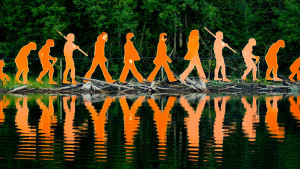What God created was good, and after thousands of years it still is. It's just that it's sometimes a little difficult to discern, says Graeme Loftus.
After completing a degree at Christ's College, Cambridge, preparing to become a minister of religion, Charles Darwin sailed in 1831 as a passenger aboard the HMS Beagle, setting off on a path that was destined to impact the world.
His five-year voyage took him to the western coast of South America, where he observed various kinds of exotic and formerly unknown animals. One set of creatures in particular, the Galapagos finches, caught Darwin's attention. He studied the birds, collected samples, and observed that they had various beak sizes and shapes. It was his observations of these variations that inspired the initial development of his “theory of origins.” He returned to England in 1836 and in 1842 began drafting On the Origin of Species by Means of Natural Selection, or the Preservation of Favoured Races in the Struggle for Life (often more simply referred to as Origin of Species), which was ultimately published in 1859.
Shortly after its publication, he carried on a long correspondence with his friend and colleague Asa Gray, stating his own doubts and his sense of confusion about the end and ultimate directions of evolution: “I am conscious that I am in an utterly hopeless muddle,” he confessed. “I cannot think that the world, as we see it, is the result of chance; and yet I cannot look at each separate thing as the result of design.”
The confusion that Darwin expressed came as he tried to connect all the wonders of the natural world that he observed with all the harsh things he saw existing alongside that beauty. Because of all the destructive forces he witnessed, he chose to reject God rather than seek a biblical interpretation of those distortions within the created world.
The same dilemma faces every one of us as we struggle to understand our origins. We cannot but help asking questions such as, “Where did I come from?” “How did I get here?” and, “How do I ascribe meaning to my existence?”
Darwin ultimately adopted an “atheistic” theory to explain origins. Atheism is literally, against “theism.” It is a theory that leaves God out of the picture all together, in all things. Theism, on the other hand, offers an explanation of our origins taking God into consideration. In one sense, both atheism and theism are theories about our beginnings, because none of us were actually there to personally witness how everything began. We have to examine the evidence of each theory and make up our minds.
Evolution is based on certain assumptions, outlined as follows by Dr G A Kerkut, of the University of Southampton in England.
- Non-living things gave rise to living material.
- This spontaneous generation occurred only once.
- Viruses, bacteria, plants and animals are all interrelated.
- The one-celled organisms gave rise to many-celled organisms.
- All the organisms without vertebrae are interrelated.
- Those organisms without vertebrae gave rise to ones with vertebrae.
- Fish gave rise to amphibia, then reptiles, then birds, and finally mammals.
I leave readers to make their own conclusions about the probability of these assumptions actually occurring. The Bible, however, gives us compelling evidence to help us draw other conclusions concerning our origins.
The apostle Paul rightly says that all humans know something about God through reflecting on nature, even if they don't have any knowledge of Scripture: “For since the creation of the world God's invisible qualities—his eternal power and divine nature—have been clearly seen, being understood from what has been made, so that men are without excuse” (Romans 1:20).
We may not know everything about God from studying nature, Paul says, but there are two things we can know about His invisible qualities. The first is that He is eternally powerful, and the other is that He is divine. Darwin may not have chosen to align the power governing his “natural selection” with the God of the Bible, but he still describes it as eternal and in terms equivalent, in essence, to divinity. His deity was, in some sense, unknown, or needed an interpreter.
The Bible declares the real nature of that unknown God without apology: “Now what you worship as something unknown I am going to proclaim to you. The God who made the world and everything in it is the Lord of heaven and earth... . He himself gives all men life and breath and everything else. From one man he made every nation of men, that they should inhabit the whole earth; and he determined the times set for them and the exact places where they should live. God did this so that men would seek him and perhaps reach out for him and find him, though he is not far from each one of us. ‘For in him we live and move and have our being.' ... In the past God overlooked such ignorance, but now he commands all people everywhere to repent. For he has set a day when he will judge the world with justice by the man he has appointed. He has given proof of this to all men by raising him from the dead” (Acts 17:23-31).
The question of origins is decided by whether or not we accept the resurrection of Jesus and His claims to be the creator of everything that existed and, as such, our Lord (see John 1:1-3, 14). When, in the Gospel of John, Jesus is called the “Word” who has never had a beginning, is just as much God as the Father, and made everything that existed, we have to decide whether He is deluded or authentic.
The story of Creation of Genesis 1:3, 6, 9 and following, describes the Word speaking everything into existence in terms of “And God said ... .” “And God said ...” “And God said ...” and so on. That which did not previously exist, it claims, suddenly came into existence.
There is an intangible quality in the nature of Christ's spoken words that intrinsically brings life with them. In the presence of a man who had been dead for four days and whose body was decomposing, Jesus called in a loud voice, “Lazarus, come out!” and the dead man came out full of life again (John 11:43). It's been suggested that if Jesus hadn't limited that command to Lazarus alone, every dead person in the grave would have come forth at His words.
The same is true in a spiritual sense. Before we acknowledge Jesus as the Creator of the universe, Saviour of the earth, and Lord of our lives, the Bible describes us as being dead. But when we hear the living Word of the life, death and resurrection of Jesus and respond to it, we too come alive in our spirit. “Because of his great love for us, God, who is rich in mercy, made us alive with Christ even when we were dead in transgressions—it is by grace you have been saved.” (Ephesians 2:4, 5).
Even a casual reading of the Genesis account of Creation reveals the heart of God for His creatures and His Creation: “God saw all that he had made, and it was very good” (Genesis 1:31).
There was nothing in all of creation that reflected the destruction that confused Darwin.
Every animal, every plant, every aspect of that freshly created planet reflected the glory of God and His benevolent purpose for His creatures. It is not until humanity rejected that life-giving word of Jesus, their Creator, that the earth brought forth thistles and everything else that subsequently cursed the earth (see Genesis 3:1-16).
It is this understanding that gives us an interpreter to make sense out of the current state of the earth and everything in it. But the same creative Lord who originally spoke the world into being, says, “I will create new heavens and a new earth” (Isaiah 65:17).
Until then, His creation “waits in eager expectation for the sons of God to be revealed,” writes the apostle Paul. “For the creation was subjected to frustration, not by its own choice, but by the will of the one who subjected it, in hope that the creation itself will be liberated from its bondage to decay and brought into the glorious freedom of the children of God.”
And he concludes, “We know that the whole creation has been groaning as in the pains of childbirth right up to the present time. Not only so, but we ourselves, who have the firstfruits of the Spirit, groan inwardly as we wait eagerly for our adoption as sons, the redemption of our bodies” (Romans 8:19-23).
And Jesus is as good as His word.





